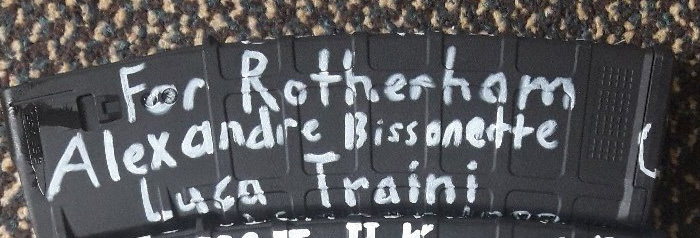U.S. President Donald Trump said he thinks that white nationalism is “not really” a growing threat on Friday following attacks on two mosques in New Zealand that left 49 people dead.

Trump was asked by a reporter if he saw a rise in white nationalism and responded: “I don’t, really.”
“I think it’s a small group of people that have very, very serious problems, I guess,” Trump said. “If you look at what happened in New Zealand, perhaps that’s the case. I don’t know enough about it yet. But it’s certainly a terrible thing.”
His remarks come after shootings at two mosques in Christchurch, New Zealand, that left 49 people dead and 42 injured on Friday afternoon local time.
A 28-year-old Australian man, identified as Brenton Harrison Tarrant, is now in custody and has been charged with murder. He appeared in court Saturday morning local time.
Forty-one were killed at Al Noor Mosque on Deans Road and seven more were fatally shot at another mosque in Linwood, a suburb of Christchurch. One person died in hospital.
Two others are in custody, police said.
WATCH: 49 killed, 5-year-old child among injured following Christchurch mosque shootings

Before the attack, a manifesto on social media under the name Brenton Tarrant. In it, which was presented as a Q&A, he described himself as an ethno-nationalist and fascist, and that he viewed Trump as a “symbol of renewed white identity.”
“Were/are you a supporter of Donald Trump?” the document says. “As a symbol of renewed white identity and common purpose? Sure. As a policy maker and leader? Dear god no.”
The 74-page document railed against Muslims and espoused far-right and anti-immigration ideology. It also contained conspiracy theories about “white genocide” and references a conflict between people of European descent and Muslims. It often references the Crusades, a common theme among far-right extremists.
Tarrant claimed he was inspired by other right-wing extremists, such as Dylann Roof, who killed nine black churchgoers in Charleston, S.C. in 2015, and Anders Breivik, a Norwegian extremist who killed 77 people.

Get daily National news
Trump said on Friday he has not seen the manifesto.
“I didn’t see it. I didn’t see it,” he said. “But I think it’s a horrible event … a horrible, disgraceful thing and a horrible act.”
A Twitter account with the handle @brentontarrant, the name the attack was broadcast under on social media, posted a now-deleted photo of weapons and equipment with names of past extremists and mass shooters written in white. The name of Alexandre Bissonnette, who killed six people in an attack on a Quebec City mosque in 2017, was among them.

WATCH: Taking apart the writing and symbols on the alleged Christchurch guns

Trump gave a statement of support to New Zealand Friday afternoon in a tweet, saying that he had “just spoke” with New Zealand Prime Minister Jacnida Ardern and he informed the prime minister that the U.S. stands “in solidarity with New Zealand” and offered assistance to the country.
The White House has called the act a “vicious act of hate” in a statement Friday morning, but did not specifically say it was at a mosque or that Muslims were killed.
“The United States strongly condemns the attack in Christchurch. Our thoughts and prayers are with the victims and their families,” press secretary Sarah Sanders said in a statement. “We stand in solidarity with the people of New Zealand and their government against this vicious act of hate.”
Mercedes Schlapp, the White House’s director of strategic communication, told reporters that it was “outrageous” to make the connection between the shooting and Trump.
“It’s outrageous to even make that connection between this deranged individual that committed this evil crime to the president who has repeatedly condemned bigotry, racism and made it very clear that this is a terrorist attack,” she said. “We are there to support and stand with the people of New Zealand.”
Trump has received criticism over his response to white supremacy in the past. After a 2017 clash between white nationalists and anti-racist protestors in Charlottesville, Virginia, that left one demonstrator dead, Trump said there were “very fine people on both sides” of the confrontation.
WATCH: Trump expresses sorrow, U.S. with New Zealand ‘all the way’ in call to PM after mosque attacks

The Council on American-Islamic Relations (CAIR) has called on Trump to call shootings “white supremacist terrorist attacks.”
In January, New York-based Anti-Defamation League said that domestic extremists killed at least 50 people in the U.S. in 2018, up from 37 in 2017.
“White supremacists were responsible for the great majority of the killings, which is typically the case,” they said.
-With files from Andrew Russell and the Associated Press







Comments